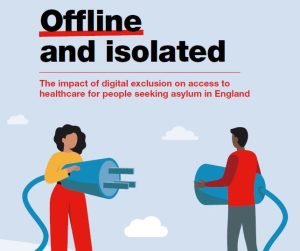Asylum seekers being digitally excluded in the UK – report
People seeking asylum in the UK face a struggle to access the internet and are at risk of being digitally excluded, a new report from the British Red Cross says.
The report focuses on access to healthcare, which is increasingly being digitised after the COVID-19 pandemic.
“People seeking asylum in England are at risk of being digitally excluded. Digital exclusion can create – and exacerbate – barriers to healthcare access, preventing some people seeking asylum from booking appointments, ordering prescriptions or navigating their way to appointments,” the report said.
“Digital exclusion can also restrict people’s ability to communicate with family and friends, potentially resulting in social isolation and declining physical and mental health.
“Participants highlighted numerous obstacles that prevented them from meaningfully accessing the internet. These included limited access to reliable internet and up-to-date devices; poor digital skills; illiteracy; and language barriers. Accessibility and inclusivity of online services also emerged as a barrier to digital inclusion, as did fears related to data privacy.
“Many participants found online appointments impersonal and spoke about the importance of feeling safe and being listened to when receiving care,” the report said.
 The study aimed to improve understanding of the experiences of digital exclusion among people seeking asylum, and how these experiences may impact access to, and experience of, healthcare.
The study aimed to improve understanding of the experiences of digital exclusion among people seeking asylum, and how these experiences may impact access to, and experience of, healthcare.
Researchers conducted interviews with 30 people currently seeking asylum across England for the report. The researchers themselves also had lived experience of seeking asylum.
In a statement, the British Red Cross said: “The research has returned essential insights about the intersecting obstacles that people seeking asylum face when accessing healthcare digitally.
“These obstacles compound existing barriers to accessing healthcare, and impact the experience of healthcare received. In some cases, unable to access or navigate digital healthcare services, participants avoided seeking help altogether or saw A&E as their only option.
“This inability to access primary care in a timely way undoubtedly places additional pressure on already stretched emergency care services. Participants also spoke about the impact of digital exclusion on their mental health and wellbeing, often causing isolation and loneliness.”
Asylum seekers struggled to get online and experienced multiple barriers when using digital platforms for booking and attending medical appointments, the study found.
Cost was a significant obstacle to digital access, leading to a reliance on libraries and other public spaces for the internet. All participants in the report said that the weekly asylum support allowance was insufficient for them to afford a suitable phone, mobile data or broadband.
Financial barriers also meant many asylum seekers either did not own a smartphone or else owned old or second-hand phones that were slow and could not handle modern apps or video calls.
Digital illiteracy and language barriers compounded the problems that asylum seekers faced when navigating complex registration systems and online interfaces.
The report said a lack of digital access also negatively impacts people’s mental health.
“Frequently, people seeking asylum live far away from their friends and family, often in a different part of the world. This puts them at an increased risk of isolation,” the statement said.
“Digital access can relieve this isolation by allowing people to remotely maintain their connection with loved ones. However, for many participants, barriers to digital access led them to experience loneliness and isolation, which had knock-on effects on their health.”
The report made five key recommendations, including: people seeking asylum should easily be able to access and navigate online health services; people seeking asylum should have access to free and reliable internet and obtain up-to-date digital devices such as smartphones; people seeking asylum should be offered and be able to access in-person digital literacy training; people seeking asylum should be involved in developing policies and service provisions relating to the health services they will access, and; people seeking asylum should be supported and empowered to access healthcare in a way that suits their needs.
“Access to the internet, smartphones or computers is not a luxury. These tools are a necessary part of communication in our modern world and increasingly vital for accessing basic healthcare services. Without them, people’s health is put at risk and it’s harder to integrate into communities, with an increased risk of isolation,” the British Red Cross said.
See the full report: 44-page report here.












